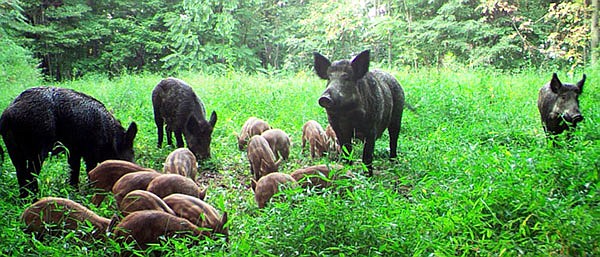It's easy to understand why when you consider the industry's economic impact on the state of Missouri is estimated to be $88.4 billion annually, according to the United States Department of Agriculture's 2016 study of the Economic Contributions of Missouri Agriculture and Forestry.
There are a lot of issues we collectively face as Missourians that are really hard to agree on. The necessity to wipe feral hogs from our landscape should not be one of them. Yet, here we are, going around and around about whether or not hunting should be allowed for a species that has no business even existing in our state.
I, and countless others, have written about and reported on the serious feral hog problem we are facing in Missouri. We have highlighted the incredible landscape damage these nuisance animals bring to both private and public lands. We have talked about the depleted resources for native wildlife, like deer, turkey and squirrel, in the form of food and habitat. We have talked about the effect on clean water and soil erosion.
Yet, the problem persists. But hope is on the horizon, because a new approach to the problem is unfolding. The agriculture community is stepping up and speaking out.
In an op-ed published by The Missouri Times, Missouri Soybean Association CEO Gary Wheeler wrote, "We got to this point through recreational hog hunting - releasing an invasive species with no natural predators for sport, and allowing escaped stock to contribute to prolific breeding in the existing feral population. We'd be foolish to put the economics and traditions of sport above our responsibilities. With feral hogs such prolific breeders they can maintain their numbers in an area even with 70 percent yearly population loss, the responsible path forward is to eradicate this invasive species and close the door to reintroduction.'
The USDA has been in the fight for a long time, but is now taking additional steps. Their division of Animal and Plant Health Inspection Service (APHIS) has been trapping hogs for years. I have gone on two different excursions with APHIS staff to learn about the seriousness of the problem hogs are creating.
It was eye opening and heartbreaking to see how extensive the damage is on private and public land. In bold type on their website it is stated, "Feral swine cause tremendous damage to agriculture, including row crops, forestry, livestock and pasture."
USDA estimates feral hogs cause approximately $2.4 billion in damages and control costs each year. At least $800 million is direct agricultural damage.
The USDA posted a "Notice of Intent To Issue Forest Order Closing the Mark Twain National Forest, Missouri to Feral Swine Hunting." In it, Frank R. Beum, acting associate deputy chief of the National Forest System, wrote, "The hunting of feral swine on the Mark Twain National Forest interferes with collaborative interagency efforts to eliminate feral swine in Missouri. Government trappers employed in these efforts identify home ranges and find the best spot in that range to catch the entire sounder all at the same time. Shooting at one or two swine or pursuing them with dogs will cause the sounder (the entire group) to scatter, which makes trapping the sounder all at the same time more difficult."
Before anyone chirps about liberals or some sort of general assault on hunting, keep in mind this statement and directive comes from a President Trump administration USDA deputy chief.
The Missouri Farm Bureau supports the full eradication of feral hogs. Their position statement is, "We believe feral hogs are an unacceptable risk to both humans and livestock and support federal and state eradication efforts. We support increasing the penalty in Missouri from a misdemeanor to a felony for the intentional release of any hogs on public land or private land without acceptable confinement. We also believe it should be a felony to hold alive or transport feral hogs without a special permit from the Missouri Department of Agriculture."
Disease spread from feral hogs is a serious threat. Swine brucellosis and pseudorabies have both been discovered in Missouri feral hogs. Each pose serious risk to humans and the swine livestock industry. The porcine reproductive and respiratory syndrome virus (PRRS) was recently confirmed in a Missouri feral hog. This disease could wipe out Missouri's multibillion dollar pork industry.
The majority of the small but vocal group of people opposing the feral hog hunting ban on public lands do not want feral hogs eradicated from our landscape, because hunting them is fun. They enjoy pursuing an invasive species and selfishly are willing to risk agriculture commodities, while accepting the destruction of private and public lands to the tune of billions of dollars, most of which to be covered by you and your fellow taxpayers, so a few can chase pigs for sport.
There's also a small contingent of elected officials, both state and federal, vocally opposing the feral hog hunting ban on public lands. These few legislators seem to seek out any opportunity they can find to give the middle finger to conservation, but if that's who they think they're hurting this time, they need to think again and listen to the leaders of Missouri Farm Bureau, Missouri Soybean Association, Missouri Pork Association, Missouri Department of Agriculture, USDA and just about every other agriculture association in existence.
If you are concerned about the spread of feral hogs in our state, and don't feel like millions and millions of your Missouri tax dollars should be spent covering for crop damage or repairing imperiled lands, then contact your elected officials and let them know enough is a enough and they must stop supporting feral hog hunting and instead put our tax dollars to work in an aggressive, all-out effort of complete eradication.
The USDA has extended a public comment period about their plan to close the Mark Twain National Forest to feral hog hunting until July 23. To submit your comment on this important issue, email [email protected].
Comments can also be sent via mail to: ATTN: Feral Swine Comment, Mark Twain National Forest, 401 Fairgrounds Rd., Rolla, MO 65401.
See you down the trail.
III
Brandon Butler, the director of communications for Roeslein Alternative Energy, is an outdoors columnist for the News Tribune. Contact him at [email protected].


